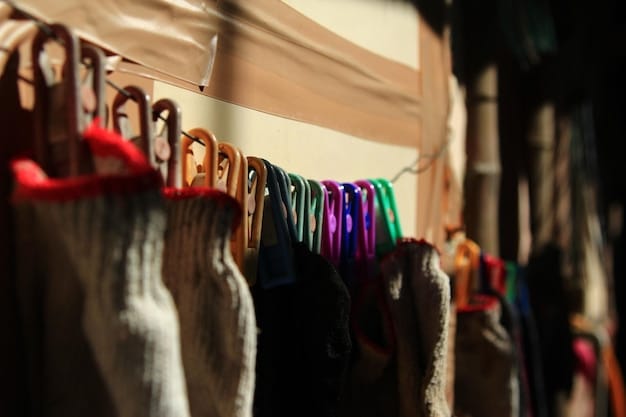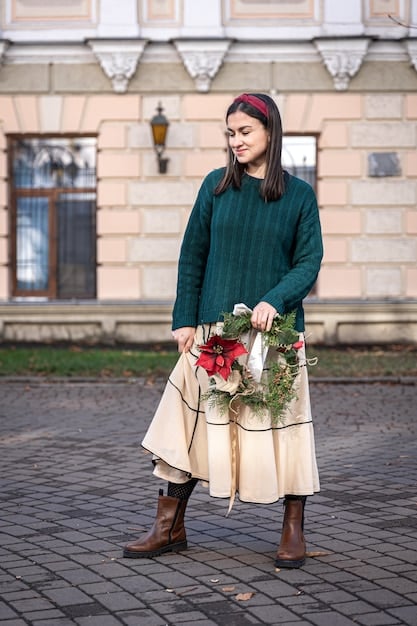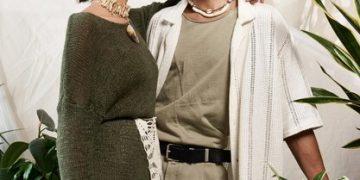Is Thrifting Still Worth It? Your 2025 Guide to Designer Deals

Thrifting remains a valuable strategy in 2025 for budget-conscious shoppers seeking designer deals, offering both financial and environmental benefits, but success depends on smart strategies and awareness of current trends.
Is thrifting still worth it? A 2025 guide to finding designer deals reveals it’s more relevant than ever. Savvy shoppers are turning to secondhand stores not just to save money, but to find unique pieces and support sustainable fashion practices.
The Evolving Landscape of Thrifting in 2025
The thrifting scene has transformed significantly. What was once a niche activity is now a mainstream option, driven by increased awareness of fast fashion’s environmental impact and a desire for individuality. This shift has led to changes in how thrift stores operate and the types of items they offer.
Understanding these changes is crucial for maximizing your thrifting success.
The Rise of Online Thrifting
Online platforms have revolutionized thrifting, making it more accessible than ever before. Websites and apps dedicated to secondhand fashion offer a vast selection of items, often curated by style or brand.
Sustainability and Ethical Consumption
Consumers are increasingly conscious of the ethical implications of their purchasing decisions. Thrifting offers a sustainable alternative to buying new, reducing waste and supporting a circular economy.
- 🌱 Reduces textile waste and landfill burden.
- 💰 Saves money compared to buying new items.
- 👚 Offers unique, vintage, and one-of-a-kind pieces.
- 🔄 Supports a circular economy and reduces demand for new production.
Thrifting in 2025 requires a strategic approach. Knowing where to look, what to look for, and how to assess quality is essential for finding those coveted designer deals.
Benefits of Thrifting for Designer Finds
Thrifting presents unique advantages for individuals seeking designer apparel. These advantages go beyond monetary savings and frequently give access to vintage or limited-edition pieces that aren’t obtainable elsewhere.
Let’s dive into the specifics.

Uncovering Rare and Vintage Pieces
Thrift stores often hold hidden gems from past decades, including designer items that are no longer in production. These vintage finds can add character and style to your wardrobe.
- 🕰️ Discover clothes from different eras, adding flair to your wardrobe.
- 💎 Unearth items that are no longer manufactured.
- ✨ Acquire truly precious and unique items.
Obtaining Designer Brands at Substantial Discounts
One of the most appealing aspects of thrifting is the potential to find designer brands at significantly reduced prices. Luxury items that would normally be out of reach become accessible through thrifting.
Thrifting gives access to both financial savings and the acquisition of distinctive, high-quality designer products.
Strategies for Successful Designer Thrifting
Effectively navigating thrift shops to find designer merchandise requires a calculated approach. Understanding how to identify genuine designer items, assessing their condition, and remaining up-to-date on current trends are all essential.
Here’s how to prepare yourself for thrifting success.
How to Spot Authentic Designer Items
Knowing how to verify the authenticity of designer goods is important. Look for indicators like logos, high-quality stitching, and unique serial numbers to avoid purchasing fakes.
Assessing the Condition of Thrifted Clothing
Carefully examine thrifted clothing for damage before purchasing. Check for stains, tears, missing buttons, and other flaws that may affect the item’s wearability.
Staying Up-to-Date on Fashion Trends
Remaining current on the newest styles enables you to locate fashionable designer products that you could incorporate into your wardrobe. Keep an eye on fashion blogs, social media, and runway shows.
By following these suggestions, you can improve your thrifting abilities and increase your chances of finding great designer goods.
The Environmental and Ethical Impact of Thrifting
Choosing to thrift is more than just a cost-effective way to shop; it’s also an environmentally and ethically responsible choice. The fashion industry is known for its substantial environmental impact, and thrifting can help mitigate some of these adverse effects.
Let’s look at the larger scenario.

Reducing Textile Waste
Thrifting reduces the amount of textile waste that ends up in landfills. By extending the life cycle of clothing, you help prevent valuable resources from being wasted.
Decreasing Demand for New Clothing Production
When you buy secondhand clothing, you lower the demand for new apparel production. This, in turn, lowers the environmental effect associated with producing new clothes, such as water use, carbon emissions, and chemical pollution.
Supporting Sustainable Fashion Practices
Choosing thrifting promotes ethical and sustainable fashion practices. It promotes a circular economy and encourages consumers to be more aware of their buying habits.
Adopting thrifting is a conscious decision that has positive environmental and ethical implications. It is an effective way to lessen your environmental effect while still enjoying fashion.
Top Thrifting Destinations in the US for Designer Deals
Specific thrift stores and areas in the United States are well-known for their high-end designer goods selections. These places are popular among thrifters looking for luxury brands at steep discounts.
Here are some of the best thrifting locations for designer finds.
Luxury Consignment Shops in Major Cities
Major cities such as New York, Los Angeles, and Chicago are home to numerous luxury consignment stores that provide curated choices of designer apparel and accessories. These shops frequently have strict authenticity standards and feature high-end merchandise.
Charity Shops in Affluent Areas
Charity stores in affluent areas frequently get donations of designer goods from high-income individuals. These stores can provide access to inexpensive luxury brands.
Flea Markets and Vintage Fairs
Flea markets and vintage fairs are wonderful places to find unique designer goods. These events frequently feature a diverse range of sellers, including those specializing in vintage and designer fashion.
Visiting these thrifting spots increases your chances of finding designer goods at unbeatable rates. It’s all about understanding where to seek for premium merchandise.
The Future of Thrifting: Trends to Watch in 2025
The thrifting industry is continually changing, and a number of trends will define its future in 2025. Staying informed about these advances will allow you to optimize your thrifting activities and stay ahead of the curve.
Let’s look at what’s coming.
AI-Powered Thrifting Platforms
Artificial intelligence (AI) is projected to play a greater role in thrifting, with AI-powered platforms providing tailored product recommendations, enhanced search capabilities, and authenticity verification. These technologies will improve the online thrifting experience.
Virtual Thrifting Experiences
Virtual and augmented reality technologies are being used to create immersive thrifting experiences. Shoppers may virtually explore thrift stores and try on garments from the comfort of their own homes, making the practice more accessible and engaging.
Sustainable Thrifting Initiatives
Efforts to promote sustainable thrifting practices are increasing. Thrift shops are implementing recycling programs, encouraging ethical sourcing, and collaborating with fashion designers to upcycle secondhand materials. These efforts are consistent with the expanding emphasis on ethical and environmentally friendly consumption.
These advancements signify a bright future for thrifting, with technological improvements and a greater focus on sustainability driving the industry ahead.
| Key Point | Brief Description |
|---|---|
| 💰 Designer Savings | Find luxury brands at deeply discounted prices. |
| 👚 Fashion Sustainability | Reduce waste by giving clothes a second life. |
| 💎 Unique Finds | Discover rare vintage and unique items. |
| ✨ Smart Shopping | Thrifting is a smart choice for your wallet and the planet. |
FAQ
▼
Thrifting helps you find designer goods for substantially less than retail. This makes luxury fashion more accessible to many people looking to save money.
▼
Examine items well for flaws such as tears or stains. Seek materials that are well-made and robust to guarantee they last. Verify that all zippers and buttons are operating.
▼
Luxury consignment shops in major cities and charity stores in wealthy areas are ideal. Flea markets and vintage fairs are also good places to uncover unique fashion treasures.
▼
Buying secondhand helps to minimize waste in landfills. Since it reduces demand for new items, it also saves resources and lessens the environmental effect of producing new clothes.
▼
Absolutely! AI can improve shopping experiences. It helps verify items and provides tailored recommendations. This helps consumers find the clothing that is ideally suited for them, easily.
Conclusion
In conclusion, thrifting is still worth it in 2025, providing not just economical savings but also a sustainable and ethical way to upgrade your wardrobe with designer finds. By using the correct tactics and remaining aware of new trends, you can enjoy the thrill of the hunt and the pleasure of owning unique, high-quality clothing without breaking the bank.





